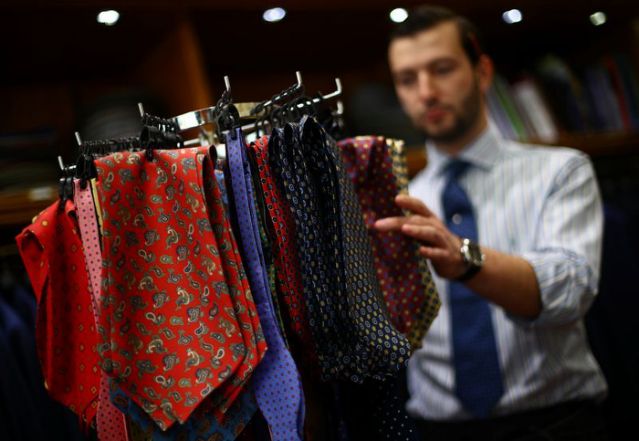Most people in white-collar jobs are working from home, with a newfound love of sweatpants, a trend that some experts expect to outlive the pandemic

Italian luxury designer Brunello Cucinelli makes men’ssuits that sell for up to 7,000 euros, but even he - like most people acrossthe globe - hasn’t worn a suit for months, let alone bought one.
Most people in white-collar jobs are working from home,with a newfound love of sweatpants, a trend that some experts expect to outlivethe pandemic. And few, if any, weddings or parties are taking place.
This seismic shift in behaviour is having profoundrepercussions across the supply chain for suits and formal wear, upending asartorial sector spanning every continent.
In Australia, the world’s biggest producer of merinowool, prices have been in freefall, hitting decade lows. Many sheep farmers arein dire straits, storing wool in every available shed in the hope of a rebound.
In northern Italy, the wool mills that buy from thefarmers and weave the fabric for high-end suits have seen their own orders fromretailers nosedive.
In the United States and Europe, several retail chainsspecialising in business attire such as Men’s Wearhouse, Brooks Brothers and TMLewin have closed stores or filed for bankruptcy over the past few months, andmore could follow.
People want to be more comfortable and are less inclinedto wear a formal suit. With Zoom conferences and smart working, you’ll see menwearing a shirt, perhaps even a tie, but not many suits.
Many merino sheep farmers are storing their wool in shedsor storage facilities; though some who are still emerging from a three-yeardrought are selling their bales into the weak market to stay financiallyafloat.
“Not everyone is big enough to hold on to their wool clipand wait for the price to change,” said Dave Young, a farmer near the New SouthWales town of Yass. “We are in the position where we have to meet the marketwithin a relatively short time after shearing.”
Young, who has about 4,500 sheep on his property, said hehad re-focused some operations to provide lamb meat instead.
“For some businesses, we are talking a 50%-80% plunge insales,” said Ettore Piacenza, general manager of the Fratelli Piacenza woolmill, a centuries-old family business with an annual turnover of 52 millioneuros. He also heads the wool mills department of the local businessassociation.
Botto Poala said more than 50% of his mill’s turnover nowcomes from wool that has been made stretchier by treating in a particular wayor having lycra added to it.
Italian luxury label Etro, for example, has just launcheda “24-hour jacket” made of jersey and mixing wool and cotton.
This is because whatever demand is left for suits, it ismore likely to be for fabrics that are more resistant to stains and don’tcrease easily, while such cloth can also be used for casual wear.
A gradual move towards casual wear has been going on foryears. In 2019, even Goldman Sachs - a bastion of bespoke suits - relaxed thedress code for its staff. Not to mention the rise of the Silicon Valley hipstercrowd.
But COVID has turbocharged that shift - boosting sales ofcomfort clothing and sportswear at the expense of business attire.
In the second quarter of this year, when much of theworld was in lockdown, Nike was the hottest brand according to Lyst, a globalfashion search platform that analyses the behaviour of more than nine milliononline shoppers a month.
It was the first time since the Lyst Index began that aluxury fashion brand did not take the top spot.
Gap’s Athleta unit, which sells tights, jogging pants,sweats and workout tops, was its best-performing fashion line in the threemonths to August 1.
Suits ranked among the highest-discounted andlowest-selling items in France, Italy and Germany in September.
The collapse in demand for office attire led to several USretailers filing for bankruptcy.
“I confess I have not purchased any office wear thisyear. I can tell you for a fact walking around the City, there are very fewsuits on display,” said James Whitaker, a partner at law firm Mayer Brown inLondon adding that his clients, mostly lawyers and bankers, “are sitting athome in their pyjamas”.